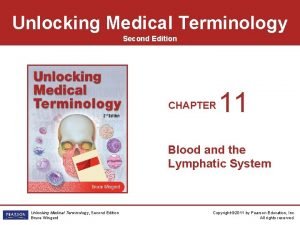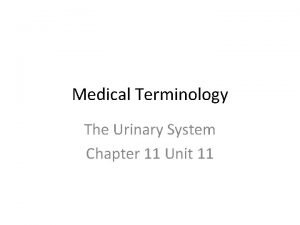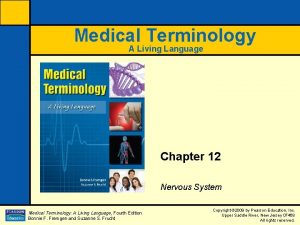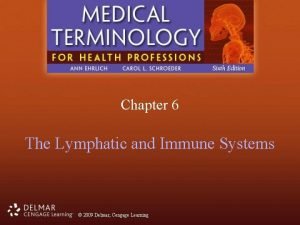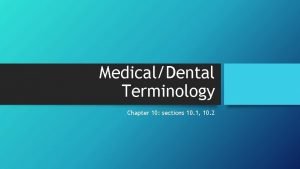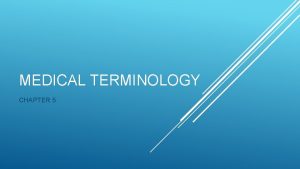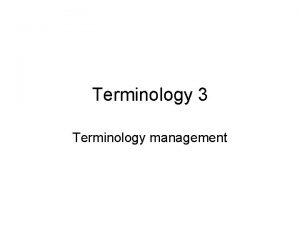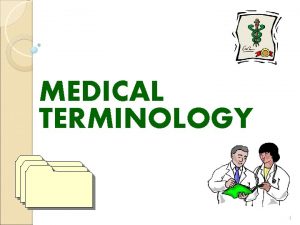MedicalDental Terminology Chapter 10 sections 10 1 10







- Slides: 7

Medical/Dental Terminology Chapter 10: sections 10. 1, 10. 2

Intro to medical terminology • Medical terminology can be fun, interesting , and challenging. At first medical terminology may seem hard to learn, however with practice it becomes much easier. You need to learn how to build a medical term, how to pronounce it, and what it means.

Forming medical terminology from word elements: • Medical terms are words that consist of several parts. All medical terms have a word root, most medical terms have root word and a prefix, a combining vowel, and suffix. In some cases the word has only a prefix and a suffix added to the root. When you add different pre fixes and suffixes it changes the meaning of the medical term. The combining vowel will make the word easier to pronounce. You build large medical term vocabulary when you learn the meaning of the medical term.

Vocabulary: 1. Terminology-Specialized terms used in any occupation 2. Word root- the main part of the word that tells what the word is about, the subject of the term your going to build. 3. Prefix-a word element added to the beginning of the word root, the prefix is added to change the meaning of the term to make it more specific. 4. Suffix- an element added to the end of the word root that changes or adds the meaning of the root word. 5. Combining vowel- makes it possible to combine several word roots, it also makes the word easier to pronounce. Example: ELECTRO + CARDIO+ GRAM = Electrocardiogram = pertaining to electricity record of the heart. (prefix) ( word root) (suffix)

Medical terminology: • • Aden/o/pathy= disease/enlargement of the glands Hepat/o/rrhagia= hemorrhage of the liver Poly/arthr/it is= inflammation of many joints Hyster/ectomy= surgical removal of the uterus Hyster/o/salping/ectomy=removal of uterus & fallopian tubes Osteo/o/por/osis= condition of pores in the bones Tendon/it is= inflammation of the tendon Osteo/arth/it is= inflammation of the bone’s joint

Define/Discuss the diagnosis: • • Gastritis. Hepatitis. Appendicitis. Pancreatitis Gastralgia. Illeitis. Colitis. Diverticulitis-

10. 1 review(complete in chapter work section in your notebook): • • • 1. what does it mean to pronounce a medical term? 2. how are prefixes and suffixes used to build a medical term? 3. what is the O called in the term adenopathy, why is it used? 4. How can you change a term ending in –a to make it plural? 5. What root word relates to the brain? 6. what is the suffix in the term endocrinology? , what does it mean?
 Chapter 9 conic sections and analytic geometry
Chapter 9 conic sections and analytic geometry How many sections are in the chapter handbook for tx hosa?
How many sections are in the chapter handbook for tx hosa? Chapter 7 conic sections and parametric equations
Chapter 7 conic sections and parametric equations Chapter 9 conic sections and analytic geometry
Chapter 9 conic sections and analytic geometry Chapter 11 medical terminology
Chapter 11 medical terminology Hyperproteinuria definition
Hyperproteinuria definition Taxia medical terminology
Taxia medical terminology Chapter 6 learning exercises medical terminology
Chapter 6 learning exercises medical terminology




